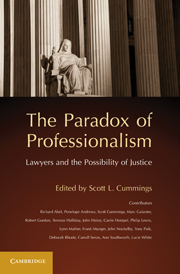Book contents
- Frontmatter
- Contents
- List of Tables and Figures
- Contributors
- Preface and Acknowledgments
- 1 Introduction
- PART I LAWYERS AND THE PUBLIC GOOD: THE FUNDAMENTAL DILEMMA
- PART II LAWYERS AND THEIR CLIENTS: DETERMINANTS OF ETHICAL PRACTICE
- 6 How and Why Do Lawyers Misbehave?
- 7 Aspects of Professionalism
- 8 Professional Regulation and Public Service
- 9 An Innovative Approach to Legal Education
- PART III LAWYERS AND SOCIAL CHANGE: MOBILIZING LAW FOR JUSTICE
- 14 Epilogue
- Index
- References
9 - An Innovative Approach to Legal Education
The Founding of the University of California, Irvine, School of Law
Published online by Cambridge University Press: 05 June 2012
- Frontmatter
- Contents
- List of Tables and Figures
- Contributors
- Preface and Acknowledgments
- 1 Introduction
- PART I LAWYERS AND THE PUBLIC GOOD: THE FUNDAMENTAL DILEMMA
- PART II LAWYERS AND THEIR CLIENTS: DETERMINANTS OF ETHICAL PRACTICE
- 6 How and Why Do Lawyers Misbehave?
- 7 Aspects of Professionalism
- 8 Professional Regulation and Public Service
- 9 An Innovative Approach to Legal Education
- PART III LAWYERS AND SOCIAL CHANGE: MOBILIZING LAW FOR JUSTICE
- 14 Epilogue
- Index
- References
Summary
INTRODUCTION
Legal practice requires credentialed expertise, hands-on skill in working with clients, and appreciation of the special responsibilities society grants to professionals. For the better part of the twentieth century, there has been an informal division of labor between law schools, which are in the business of credentialing knowledge, and first employers responsible for passing on the skills of day-to-day practice. Along the way, through both formal and informal channels, professionals are socialized to take seriously their special responsibilities to society.
Beginning in the 1960s, this informal division of labor between the tasks of credentialing, apprenticing, and developing professional identity began to shift as law schools played a more prominent role in passing on the skills of practice and teaching legal ethics. The demands for reform often came from stakeholders outside the legal academy, including elite leaders of the bar and, during the 1960s, students themselves. But, we argue, the basic assumptions of this informal architecture have remained in place; we have seen tinkering around the edges of legal education but relatively little fundamental change.
With the recent publication by the Carnegie Foundation of Educating Lawyers: Preparation for the Profession of Law, there is yet again a call for reform. In many respects, the Carnegie Report draws similar conclusions to earlier reports that resulted in very little meaningful change in legal education.
- Type
- Chapter
- Information
- The Paradox of ProfessionalismLawyers and the Possibility of Justice, pp. 169 - 194Publisher: Cambridge University PressPrint publication year: 2011
References
- 1
- Cited by

